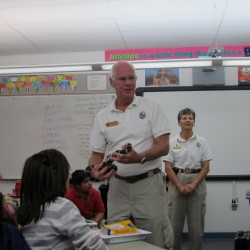After years of presenting reptile programs with live snakes in schools throughout Arizona, Colorado, Wyoming, Nevada, Iowa, and Nebraska, we have now experienced our second year of facing roadblocks from the schools.
First Occurrence
Our first such experience occurred last season when we spent the winter at Desert National Wildlife Refuge, 25 miles north of Las Vegas. After notifying schools of our outreach reptile program, we were inundated with requests from teachers. We scheduled a multitude of presentations before being notified by the school district that they needed proof of the health of our snakes, proof of insurance, and proof of our abilities. They were not even sure that live animals were allowed in schools. It wasn’t enough, it seems, that we represented the U.S. Fish and Wildlife Service and had gone through an extensive Federal background check.
The excellent management at Desert NWR, however, immediately went to work to overcome the reluctance of the school district’s administrators to allow our program. The Environmental Education and Visitor Services Specialist researched school policies and discovered that live snakes and other animals are allowed in the schools, while the Refuge Manager engaged a biologist to examine our snakes for health and question us for our background. The biologist then wrote a letter to the school district giving his approval of our animals and our proficiency. Because of their efforts, we were finally welcomed into the classrooms with our program that we delivered to hundreds of students.
Second Occurrence
While we thought this was a rare and unusual occurrence, we once again encountered a roadblock while volunteering at Lake Woodruff National Wildlife Refuge in Florida this winter. At the beginning of the season, we visited nearby schools to hand out flyers outlining our program and indicating who we represent. We had no sooner returned to the Refuge than we noticed on our computer a request from a fifth grade to visit their classrooms.
After multiple emails to set up the program and help prepare the teachers for our visit, we thought everything was finalized when we received this email: “Are we still on for December 16?” the teacher asked. “Hope so because we are excited!”
But several days later we received one more email. “Could you tell me other schools that you have been to,” the teacher requested, “and I will let you know for sure if we can do this snake visit!”
We assured the teacher that we had presented hundreds of programs over the past ten years. Then another email: “Our concern is, do the children handle the snakes in your presentation?”
While we were eventually allowed to visit the classrooms in this school with our program and the program was very well received, we learned that the principal harbored a fear of snakes and was reluctant to have us visit. The teachers had worked diligently to convince him to allow it.
[twocol_one] [/twocol_one] [twocol_one_last]
[/twocol_one] [twocol_one_last] [/twocol_one_last]
[/twocol_one_last]
Another Email
In the meantime, we received an email from another school. “You met me the other day when you came to school,” this teacher wrote. “I took the flyers from you and shared with 4th and 5th grades. Are you on the cleared Jessica Lunsford Act list?”
After Googling this act, we discovered it is Florida’s version of a security check. We responded that, even though we are not cleared with a Florida background check, we have been cleared with a Federal background check. However, we never heard from her again. Later, at the refuge manager’s request, we re-visited several schools to offer outreach once again, but to no avail.
Disappointment
When we expressed our disappointment to the refuge manager, she told us she had encountered similar problems when attempting to visit schools with a snake. “I wasn’t even allowed in my own daughter’s classroom.” she said.
Teaching to the Test?
“The teachers today have to teach to the test,” someone told us. “Maybe they just don’t have time for extra programs.” For the past 10 years that we have presented our program in schools in different states, teachers have been teaching to the test but still find time to welcome relevant programs into their classrooms. After all, children will likely encounter snakes of all kinds on their playground and should know how to react when they do. Part of our program discusses what to do if they encounter a snake, as well as what not to do.
Disbelief
“I can’t believe any place with as many snakes as Florida has would disapprove educational programming in the schools,” a wildlife manager from a different state told us. “I’m pretty sure eventually all wildlife will be replaced with ‘virtual petting or touching.’ You will touch your computer screen to see what a rabbit feels like.”
In an attempt to protect our children, we may be depriving them of valuable educational experiences. Nothing can replace actual, real-time encounters.


Enjoyed reading your article. As a former first grade teacher, it saddens me to read of the opposition you are meeting. Glad you keep trying. I know from experience that you two have a lot to offer!!
Vicki, thanks for your comments! It’s great to hear the feelings of one who has been in the educational arena.
Nothing beats knowledge and first hand experience of any subject matter. May you prevail.
Thanks, Marilyn! This is just a bump in the road……we’ll keep on target!
How discouraging! It’s difficult to overcome ignorance when teachers are the very ones perpetuating it. You will prevail, I am certain!!
David, many thanks for your thoughts on this important issue. Rather than the teachers opposing having snakes in the classroom, it could be more the reluctance of school administrators.
There is the possibility of too many worries about liabilities which keeps the doors closed to this important presentation.